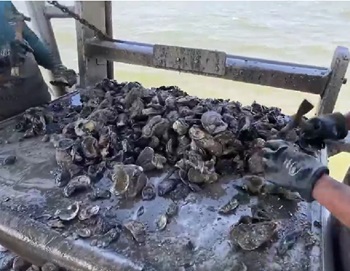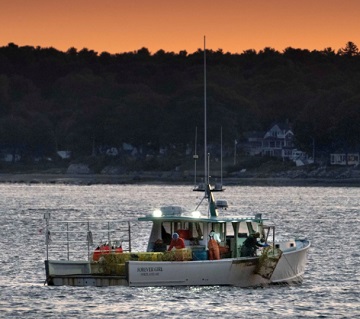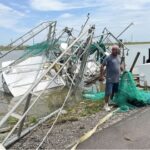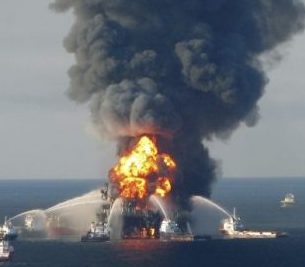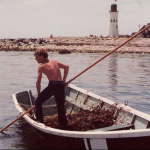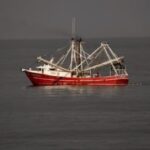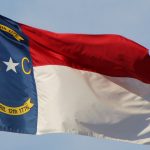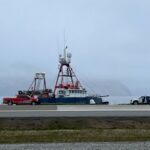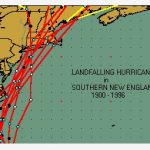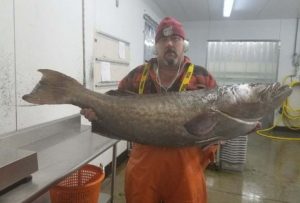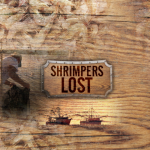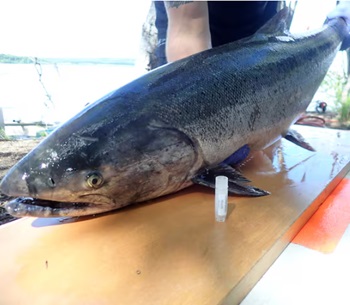 A federal appeals court on Friday reversed a judge’s decision that would have effectively shuttered an Alaska salmon fishery, a result environmentalists sought in order to protect endangered whales and threatened wild Chinook salmon populations. A three-judge panel of the San Francisco-based 9th U.S. Circuit Court of Appeals held that a judge in Seattle last year abused his discretion by vacating a key authorization issued by the U.S. National Marine Fisheries Services for the fishery’s summer and winter Chinook salmon harvests. U.S. District Judge Richard Jones at the urging of the Wild Fish Conservancy had in May 2023 vacated part of a so-called incidental take statement the fisheries service issued in 2019 that authorized the commercial Chinook salmon troll fishery in southeast Alaska. more, >>CLICK TO READ<< 10:39
A federal appeals court on Friday reversed a judge’s decision that would have effectively shuttered an Alaska salmon fishery, a result environmentalists sought in order to protect endangered whales and threatened wild Chinook salmon populations. A three-judge panel of the San Francisco-based 9th U.S. Circuit Court of Appeals held that a judge in Seattle last year abused his discretion by vacating a key authorization issued by the U.S. National Marine Fisheries Services for the fishery’s summer and winter Chinook salmon harvests. U.S. District Judge Richard Jones at the urging of the Wild Fish Conservancy had in May 2023 vacated part of a so-called incidental take statement the fisheries service issued in 2019 that authorized the commercial Chinook salmon troll fishery in southeast Alaska. more, >>CLICK TO READ<< 10:39
Tag Archives: Endangered Species Act
US appeals court allows Alaska fishery to remain open
Nantucket Group Fighting Vineyard Wind Will Take Case To U.S. Supreme Court
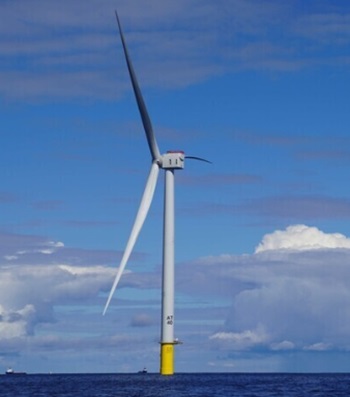 After its arguments against the Vineyard Wind project were rejected by a federal judge in April, the Nantucket group ACK 4 Whales will attempt to take its case to the U.S. Supreme Court. “There are no do-overs when the last whale is killed off,” said Val Oliver, president of ACK 4 Whales. “We will be seeking a writ of certiorari to the Supreme Court to ask for the reversal of the First Circuit’s legal errors made in our case,” Oliver added. “We believe this is the first cert. petition being filed in the wake of the Supreme Court’s decision in Loper Bright to challenge offshore wind development..” After its arguments against the Vineyard Wind project were rejected by a federal judge in April, the Nantucket group ACK 4 Whales will attempt to take its case to the U.S. Supreme Court. more. >>CLICK TO READ<< 13:45
After its arguments against the Vineyard Wind project were rejected by a federal judge in April, the Nantucket group ACK 4 Whales will attempt to take its case to the U.S. Supreme Court. “There are no do-overs when the last whale is killed off,” said Val Oliver, president of ACK 4 Whales. “We will be seeking a writ of certiorari to the Supreme Court to ask for the reversal of the First Circuit’s legal errors made in our case,” Oliver added. “We believe this is the first cert. petition being filed in the wake of the Supreme Court’s decision in Loper Bright to challenge offshore wind development..” After its arguments against the Vineyard Wind project were rejected by a federal judge in April, the Nantucket group ACK 4 Whales will attempt to take its case to the U.S. Supreme Court. more. >>CLICK TO READ<< 13:45
Feds say “damn the whales” in the Gulf of Maine
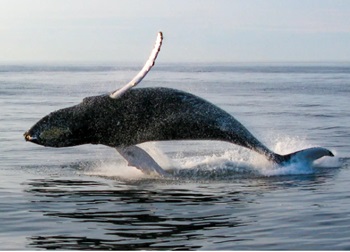 Biden’s Bureau of Ocean Energy Management (BOEM) proposes to build a huge amount of floating offshore wind in the Gulf of Maine. As required by law, it has published for public comment a draft Environmental Assessment of the area designated for this monster project. But insanely, there is no assessment of the project, just of the area without the project. I am not making this up. This place is properly called the Wind Energy Area (WEA) because that is where the wind energy will come from. BOEM says they plan to issue eight leases initially with a monster development potential of 15,000 MW. Given that 15 MW is the biggest turbine available that amounts to 1,000 or more huge turbines. A second phase might add another thousand of so. more, >>CLICK TO READ<< 12:29
Biden’s Bureau of Ocean Energy Management (BOEM) proposes to build a huge amount of floating offshore wind in the Gulf of Maine. As required by law, it has published for public comment a draft Environmental Assessment of the area designated for this monster project. But insanely, there is no assessment of the project, just of the area without the project. I am not making this up. This place is properly called the Wind Energy Area (WEA) because that is where the wind energy will come from. BOEM says they plan to issue eight leases initially with a monster development potential of 15,000 MW. Given that 15 MW is the biggest turbine available that amounts to 1,000 or more huge turbines. A second phase might add another thousand of so. more, >>CLICK TO READ<< 12:29
Coalition files intent to sue federal agencies to stop whale-killing Virginia wind project
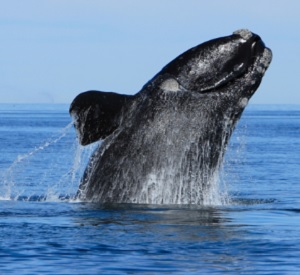 The Committee for a Constructive Tomorrow (CFACT) and The Heartland Institute today announced that they were filing with the Bureau of Ocean Energy Management (BOEM) and the National Marine Fisheries Service (NMFS) a 60 Day Notice of Intent to Sue letter for a violation of the Endangered Species Act. The violation is contained in a defective “biological opinion,” which authorizes the construction of the Virginia Offshore Wind Project (VOW). The 60-day notice is required by the Endangered Species Act (ESA) for parties who wish to commence litigation against BOEM for failure to provide adequate protection of the North Atlantic right whale and other endangered species. The North Atlantic right whale is listed as “critically endangered” by the governments of both the Commonwealth of Virginia and the United States. >>click to read<< 12:23
The Committee for a Constructive Tomorrow (CFACT) and The Heartland Institute today announced that they were filing with the Bureau of Ocean Energy Management (BOEM) and the National Marine Fisheries Service (NMFS) a 60 Day Notice of Intent to Sue letter for a violation of the Endangered Species Act. The violation is contained in a defective “biological opinion,” which authorizes the construction of the Virginia Offshore Wind Project (VOW). The 60-day notice is required by the Endangered Species Act (ESA) for parties who wish to commence litigation against BOEM for failure to provide adequate protection of the North Atlantic right whale and other endangered species. The North Atlantic right whale is listed as “critically endangered” by the governments of both the Commonwealth of Virginia and the United States. >>click to read<< 12:23
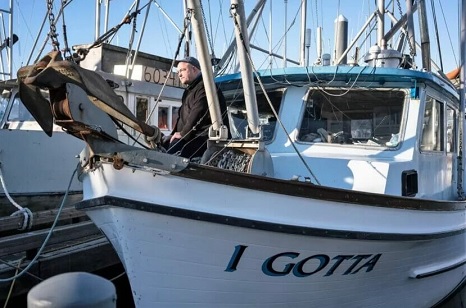
3 Alaska trollers contemplate a summer without chinook
Barring a stay, or a successful appeal, or other eleventh-hour legal action, there will be no troll fishery for king salmon in Southeast Alaska either this summer or winter. The fisheries have been canceled by order of the U.S. District Court of Western Washington on largely procedural grounds. According to the ruling they stem from a violation of the Endangered Species Act, and the failure of the National Marine Fisheries Service to fully address the impact of Alaska’s king salmon trollers on an endangered population of orcas in Puget Sound called Southern Resident killer whales. No other salmon species or commercial gear group or sport fishery anywhere on the entire Pacific Northwest coast is affected by the order, just commercial trolling for king salmon in Southeast Alaska. photos, >click to read/listen< 13:39
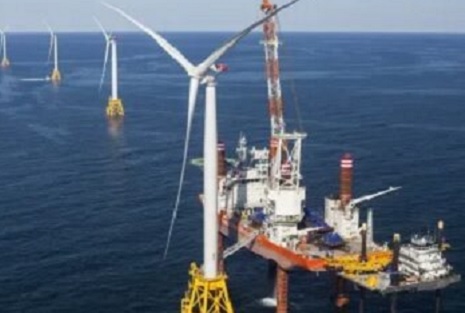
Where have all the dead whales gone? By Nils Stolpe, FishNet-USA
Beginning in December of last year and extending through most of the first quarter of 2023, New Jersey and New York beaches were inundated with abnormally high numbers of dead or dying whales and smaller marine mammals. These majestic creatures-though not so majestic when being pushed about willy-nilly by tides, wind, waves and various types of earth moving machines-have never expired in such large numbers in such publicly accessible locations in local residents’ memories. Perhaps coincidently, intensive hydroacoustic surveys to determine the suitability of potential sites for the construction of thousands of gigantic windmills and their supporting infrastructure (supposedly to help us all survive what is being sold as an imminent energy/climate crisis) were being committed offshore of the beaches where all of these marine mammal deaths and strandings have been concentrated. To us inveterate observers of that hunk of Atlantic Ocean real estate known as the New York Bight, and the critters that temporarily or permanently live there, and of the actions of the public agencies charged with-and entitled to tens of millions of taxpayer dollars each year to do so-administering the Endangered Species and the Marine Mammal Protection Acts, that surely hints at, at best, ineptitude at that’s ineptitude at a fairly advanced level. >click to read the article< 16:14

Celebrate Whale Week with NOAA Fisheries: A message from Janet Coit, Assistant Administrator
At NOAA Fisheries, our team of dedicated scientists and managers is responsible for the health and sustainability of more than 30 whale species in U.S and territorial waters. Every year, we spend a week taking a deeper dive to share our whale expertise. This year is particularly notable because it is the 50th anniversary of the Endangered Species Act. Some of the most recognizable whales—North Atlantic right whales, Southern Resident killer whales, and Cook Inlet belugas—are at the top of our Species in the Spotlight initiative. >click to read< 18:33
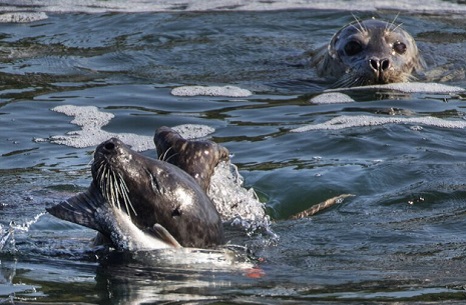
Battle over endangered fish has led Oregon to cull sea lions
While sea lion populations in the Pacific Northwest have soared in recent decades, salmon and steelhead numbers have not. And sea lions’ voracious appetite for salmon is the issue at hand. Many of the fish that sea lions eat are among 13 threatened and endangered runs protected under the federal Endangered Species Act. And groups of sea lions have taken to simply waiting at the Bonneville Dam, Willamette Falls and other pinch points where the fish gather as they struggle to make their way upriver to spawn. The Oregon Department of Fish & Wildlife estimates that sea lions eat up to 44% of the Columbia River spring Chinook run and 25% of the Willamette winter steelhead run each year. Video, >click to read< 09:11

Lawsuit claims US federal government violated regulations in approving Massachusetts offshore wind project
A Texas non-profit research institute that aims to promote free enterprise in Texas and the nation is acting on behalf of fishing companies in Massachusetts, a state 2,000 miles away, in a lawsuit that seeks to stop development of the Vineyard Wind offshore wind project. The Texas Public Policy Foundation (TPPF) has named the US Department of the Interior, the US Department of Commerce, the US Department of Defense and other agencies and individuals as defendants in the suit. The lawsuit, filed in December 2021, claims the defendants violated the Outer Continental Shelf Lands Act, the Endangered Species Act, the Clean Water Act, the Marine Mammal Protection Act, the National Environmental Policy Act, and their respective rules and regulations. >click to read< 10:54
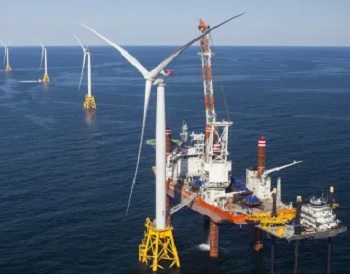
4 lawsuits threaten Vineyard Wind
The lawsuits against America’s first major offshore wind project are coming to a head. Four cases are challenging the federal environmental permit issued to Vineyard Wind, a 62-turbine facility being planned for construction in the waters off Martha’s Vineyard. A federal judge in Massachusetts heard arguments brought by landowners in two cases in recent weeks. The other two suits, brought by fishing groups, have been consolidated and will appear before the same judge for oral arguments in Boston on Monday. The cases against Vineyard Wind allege that the Bureau of Ocean Energy Management conducted an inadequate environmental review when it approved the project by failing to account for its impact on everything from fishermen to the critically endangered North American right whale. >click to read< 07:32

Maine delegation to fight bill that would repeal ‘pause’ in lobstering regulations
When Congress passed a law in December that included a six-year reprieve from new federal regulations for the lobster industry, the fishery heaved a sigh of relief. But if a new bill introduced this week in the House of Representatives is approved, that relief would be short-lived. Maine’s congressional delegation says they are committed to ensuring that doesn’t happen. On Monday, Rep. Raul Grijalva, D-Arizona, introduced The Restoring Effective Science-based Conservation Under Environmental Laws Protecting Whales Act, or the RESCUE Whales Act. If passed, the bill would repeal the protections for the lobster fishery that were included in the 2022 federal omnibus spending law. The omnibus poses an “existential threat” to the North Atlantic right whale, undermines the science-based protections of both the Endangered Species Act and the Marine Mammal Protection Act, and ignores possible solutions like “ropeless gear,” Grijalva said in a statement. >click to read< 11:31
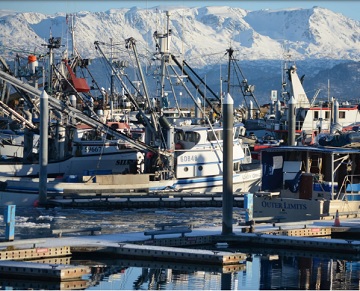
Lawsuit threatens to shut down Southeast salmon troll fishery
An ongoing lawsuit by a Washington State environmental group is threatening to shut down the Southeast Alaska salmon troll fishery in the summer and winter to help endangered Puget Sound orca whales, and has prompted the trollers to ask the City of Sitka to help pony up for legal bills. The Seattle-based group Wild Fish Conservancy filed suit last year and a federal court ruled last August that the National Marine Fisheries Service had violated the Endangered Species Act and the National Environmental Policy Act in approving salmon harvests in the Southeast troll fishery, which catches chinook salmon, a key food source for the Puget Sound orcas. In the meantime, lawsuits and rulings are continuing. >click to read< 08:36

With bill’s passage, lobster industry welcomes 6-year break from new regulations
Hours before a stopgap spending measure was set to expire, Congress voted to pass the $1.7 trillion omnibus package to fund the government through September 2023. The package passed in the Senate Thursday afternoon with a large bipartisan majority, 68-29. Maine’s delegation was able to include a rider in the package that protects lobstermen for six years from rules that the industry says would decimate the state’s iconic fishery and coastal economy. The provision essentially reverses a federal court decision this summer on new lobstering regulations by preventing them from taking effect until Dec. 31, 2028. >click to read< 09:14
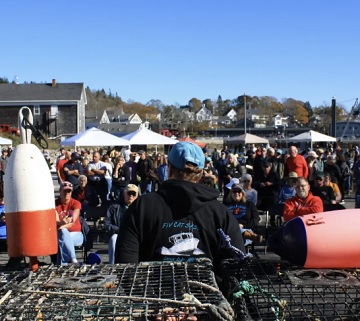
Fishermen and politicians pledge to battle for Maine’s lobster industry in Stonington
More than 200 lobstermen and supporters amassed in the state’s most valuable fishing port Sunday to say they will continue to fight any attempts to put new regulations on the industry. Marine Resources Commissioner Patrick Keliher, one of more than 20 speakers at the rally, said regulators need to get better data on whale migration patterns in the Gulf of Maine. Julie Eaton of Deer Isle, who fishes out of Stonington, said fishermen have repeatedly sacrificed for years, changing their gear to accommodate new regulations. >click to read< 08:31
‘90% reduction decimates this whole town’: Lobsterman’s rally held in Stonington – “If you’re not here fighting for this, there might not be another day,” said Richard Larrabee Jr. “A 90% reduction decimates this whole town, our children ‘s futures. If my son wants to go fishing, he doesn’t have that option.” Video, >click to read<

Whale injuries from drift gillnets off California spark lawsuit against U.S.
Environmentalists on Thursday sued the agency overseeing U.S. fisheries, claiming it had failed to protect endangered humpback whales from entanglement in drift gillnets used in commercial fishing off California. The lawsuit accuses the National Marine Fisheries Service of violating the Endangered Species Act by allowing drift gillnets without safeguards and failing to take into account the harm posed to whales already at risk of extinction. >click to read<, – The Center for Biological Diversity sued NOAA Fisheries today to force it to protect endangered Pacific humpback whales from entanglements in California drift gillnets. In the past two fishing seasons an estimated 12 Pacific humpbacks were caught in the California drift gillnet fishery, according to federal reports. >click to read< 10:35

Maine Elected Officials Rebuke “Seafood Watch” But Stay Silent on Endangered Species Act’s Threat to Lobstermen
Maine lobster was recently placed on the unsustainable “red list” by the environmental group Seafood Watch, a non-profit associated with the Monterey Bay Aquarium. Gov. Janet Mills, Sens. Susan Collins and Angus King, and Reps. Chellie Pingree and Jared Golden all came out in defense of the Maine lobster industry, defending its sustainability bona fides. It was a nice photo op, but the truth is King, Collins, and Pingree had plenty of warnings that the environmental left was using the Endangered Species Act (ESA) to damage Maine’s economy and sovereignty. They chose to do nothing. >click to read< 09:14

Proposed Virginia offshore wind farm threatens North Atlantic Right Whales
The proposed Coastal Virginia Offshore Wind Project is directly in the NARWs’ annual migration path. Dominion Energy has applied to erect 176 wind turbines, covering an area of approximately 10 miles by 15 miles—equal to the size of 85,000 football fields or the city of Tampa, Florida—located 27 miles off the coast of Virginia Beach. Each turbine will sit atop a monopole extending a minimum of 80 feet into the water and about 120 feet into the ocean floor, and its height above the water will top 620 feet. That’s higher than the Washington Monument, which is 555 feet tall. “How to kill whales with offshore wind?” Wojick asks. “Just push them into traffic. The collision deaths would not be directly attributable to the wall of noise created by the OSW project, so who would know?” >click to read< 08:55

On The Ropes – Federal court rules against lobster industry in appeal of whale protection regulations
“Obviously, it’s devastating to the lobster industry,” Stonington Town Manager Kathleen Billings told the Islander. Stonington lands by far the most lobsters in the state. In total, Maine lobstermen added an estimated $724,949,426 worth of lobster landings to the state commercial fishery in 2021. “We have a lot at stake,” Billings continued. “[Lobstering] makes up $60 [million] to $70 million to our economy and to have this recent ruling, and also too with the Seafood Watch list designation, they pretty much put a torch to our industry and burnt it to the ground for us.” >click to read< 08:55

Entanglement blame game good for wallets, not for whales
In response to the dissemination of “misleading and false information” about the Maine lobster fishery and their interaction with right whales, not even the federal government (NOAA/NMFS) attributes a right whale death to the Maine fishery. In fact, only two whales have ever been seen in Maine lobster gear and the last one was 18 years ago. A red marker found on gear in 2012 could have come from anywhere in New England. Maine lobstermen voluntarily changed their marker color to purple in 2020 to clearly differentiate themselves from the other New England states and to avoid any further allegations. Deaths and serious injuries in Maine lobster gear have remained constant at zero since right whale observations were initiated. To improve on that is impossible. >click to continue reading<, By Jack Merrill 15:35

Fishery interests urge judge to rule in lobster lawsuit
Parties in a lobster industry lawsuit filed against federal regulators are urging a judge to make a decision in the case because its outcome affects a parallel case that the parties have to act on. The federal judge considering this decision was the same who ruled last month that new regulations to protect endangered right whales do not go far enough and violate both the Endangered Species Act and Marine Mammal Protection Act. In that case, U.S. District Judge James Boasberg asked the parties to propose remedies. The lobster association’s case takes aim at newly enacted and proposed federal regulations to protect the whales, which the association says are invalid because they are based on flawed assumptions and calculations. The parties need to know the court’s opinion so they can develop proposed remedies that Boasberg ordered in the parallel lawsuit brought by conservation groups. >click to read< 17:01
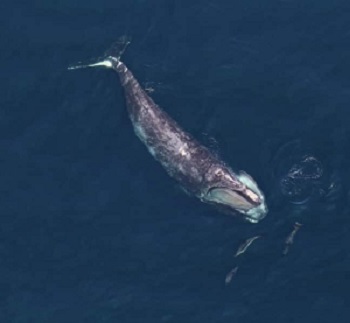
North Atlantic Right Whale: Oceana Wins First Step In USMCA Complaint
The Secretariat for the Commission for Environmental Cooperation, part of the United States-Mexico-Canada Agreement (USMCA), has agreed to move forward with the first step in a two-step process to investigate the USA’s failure to uphold its environmental laws to protect North Atlantic right whales, according to an Oceana announcement this week. The decision was in response to Oceana’s filing the first-ever “Submission on Enforcement Matters” against the US government under the USMCA last October. The ocean advocacy organization claimed the government has violated the USMCA by failing to enforce environmental laws to protect critically endangered North Atlantic right whales, of which only around 330 remain. >click to read< 14:53
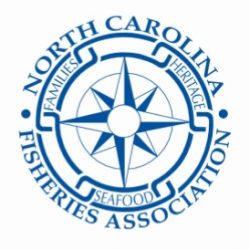
North Carolina Fisheries Association Weekly Update for April 25, 2022
Is North Carolina allowing fishermen to circumvent the Endangered Species Act? On April 6, 2022, the Coastal Conservation Association (CCA) of North Carolina sent out an email with so much disinformation I can’t even begin to address it all in one article. The email contained many of the same half-truths and outright lies we’ve been exposing over the last few months but one, above all, really rubbed me the wrong way. The CCA claimed that the “use of gill nets continues in North Carolina waters because the state holds two permits on behalf of commercial fishermen that allow them to circumvent the Endangered Species Act protections and kill or harm endangered sea turtles and sturgeon.” Circumvent. Really? >click to read the WeeklyUpdate<, to read all the updates >click here<, for older updates listed as NCFA >click here< 08:58

Maine lobster industry fights lawsuit that aims to shut down fishery
While Maine’s lobster industry has been fighting an offensive legal battle against impending rules to protect endangered North Atlantic right whales, it also is playing defense in a case brought by environmentalists that seeks to shut down the lobster fishery entirely. Lobster industry groups are intervening in a case brought in Washington, D.C.’s U.S. District Court by the Center for Biological Diversity and other plaintiffs that argues the new federal restrictions aren’t adequate, and that the fishery’s continued operation poses an existential threat to the whales. >click to read< 19:15

ACK Residents Against Turbines not aligned with fossil fuel money
The Jan. 21 article by Doug Fraser, “Nuclear and Fossil Fuel Advocates, Wind Foes Among Backers of Right Whale Protection Suits,” misleads the public by attempting to draw a false link between ACK Residents Against Turbines, which opposes development of industrial-scale wind farms off the coast of New England, and other groups associated with the fossil fuel industry. Some groups oppose industrial offshore wind development because it will harm pristine ocean views enjoyed by all; others are opposed to the dramatic increase in electric rates experienced by countries that have adopted it or to the devastating impact it will have on commercial fishing. These are all valid concerns. ACK Residents Against Turbines is opposed to the industrialization of our ocean because the turbines, massive offshore substations, and vast undersea high voltage cable systems will damage the fragile marine ecosystem. >click to read< 15:12 By Vallorie Oliver President, Nantucket Residents Against Turbines

North Atlantic Right Whale: Extinction Is Looming. Everyone’s Fighting.
This May, new rules created for the lobster industry by the National Marine Fisheries Service will become official policy for boats operating in right whale territory. The agency estimates that lobster and Jonah crab traps are responsible for 95 percent of vertical end-line ropes in the areas where whale protections apply and therefore pose the most risk for entangling whales. The Fisheries Service says these changes will reduce the risk of death and serious injury by 69 percent. But in the months after the rules were finalized, the agency has seen pushback from conservation groups, who argue the new protections aren’t enough, and lobster fishing crews, who say the rules will harm their business. >click to read< 14:22
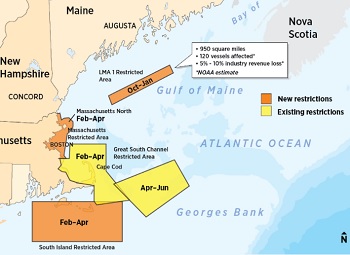
Gulf of Maine: Whale scientists fire back – Marine biologists disagree with a judge’s decision
Lobster industry professionals, elected officials and now a federal judge have expressed doubts as to whether the National Marine Fisheries Service used the best available science in imposing the closure, and whether the whales even frequent the area. They all argue that the statistical modeling used by federal regulators leaves much to be desired. Sean Todd, a marine biologist and director of Allied Whale, a marine mammal research group located at the College of the Atlantic in Bar Harbor, disagrees with both the decision to block the closure and the claim that there are insufficient data to justify it. >click to read< 09:27
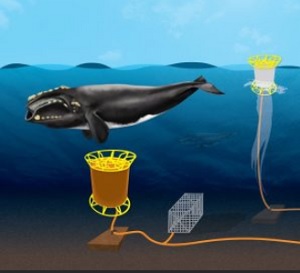
Fed Right whale plan could mean lobster industry changes – a reinvention of the fishery as we know it
Federal officials recently released plans,,, But it’s the risk reduction target, an aggressive 98 percent, that Maine Department of Marine Resources officials said means only one thing, “a complete reinvention of the fishery as we know it.” The conservation framework, an addition to the 582-page biological opinion, creates a four-phased approach to all but eliminate the death and serious injury of the whales in federally managed fishing grounds. The first phase calls for a 60 percent reduction in right whale deaths and serious injuries this year. Patrice McCarron, Maine Lobstermen’s Association, fears the industry can’t sustain that level of change. “If you look at the changes we’ve made over the last 25 years, there’s not a lot left to give,”, >click to read< 10:27
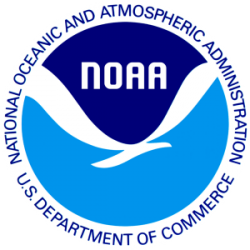
NOAA Fisheries Releases Final “Batched” Biological Opinion & North Atlantic Right Whale Conservation Framework
NOAA Fisheries released its Endangered Species Act (ESA) section 7 Biological Opinion on the authorization of eight federal fisheries management plans under the MSA two interstate fishery management plans under the Atlantic Coastal Fisheries Cooperative Management Act, and the implementation of the New England Fishery Management Council’s Omnibus Essential Fish Habitat Amendment 2. We also released the North Atlantic Right Whale Conservation Framework for Federal Fisheries in the Greater Atlantic Region (Conservation Framework). NOAA Fisheries has evaluated the effects of the authorization of the fisheries, as modified by the Conservation Framework, on endangered and threatened species. The 10 fisheries included in the Opinion are: >click to read< 12:22






